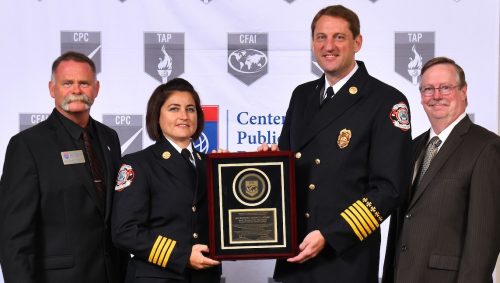
The NCFD was unanimously awarded Accredited Agency Status by the Commission on Fire Accreditation International (CFAI) at the Center for Public Safety Excellence Commission hearings in Dallas, TX on August 9, 2018. The NCFD is one of only 247 agencies worldwide and one of nine in South Carolina (MCAS Beaufort, Charleston, Mt. Pleasant, Hilton Head, Charleston AFB, Parris Island, Shaw AFB, Spartanburg) to obtain CFAI Accredited Agency Status.
The Accreditation model provides a comprehensive self-assessment and evaluation process that enables fire and emergency service agencies to examine performance levels and compare them to industry best practices. Departments are required to develop a community-driven strategic plan, standards of cover assessment and an extensive risk analysis of the community they serve. The model examines 244 performance indicators that must be verified through an on-site peer review by subject matter experts from around the country.
It typically takes a fire department 3-5 years to become accredited. The accreditation is recognized worldwide as a measure of excellence in the fire service.
Commentary by Chief Bulanow
We can now proudly declare that the North Charleston Fire Department is an internationally accredited fire department. Does this matter? For our city today and throughout its future, it does, indeed.
Modern day firefighters fight fires and help save lives, from senior citizens who need our help to new-born babies that we’ve just delivered. In our department, we are becoming better and more successful in all types of calls, in many types of environments, at land and even at sea. Last week, for example, our fireboat crew assisted a Coast Guard helicopter rescuing three people from their wrecked sailboat, and the fireboat also assisted in Georgetown. We’re in a continuous training cycle and always striving for improvements, from preventing fires to fighting fires, and providing first responder emergency services.
International accreditation documents the determination of our department to serve our citizens with responses measured by the highest standards in the world. Accreditation is an achievement to be celebrated proudly, but it is a process, also. We are accredited, and now we have to work even harder to remain accredited.
Accreditation is not an easy project. It involves the gut-wrenching work of challenging the status-quo, putting all issues on the table, changing ways of thinking and how we do business. That’s why only 187 of the 38,000 fire departments in the United States are accredited.
Accreditation isn’t only about another power-point presentation, or thicker binders full of policies and procedures, or bulletin boards with bar-graphs and pie-charts, or spreadsheets with rows of numbers, or GIS maps with colored dots or posters with high-minded words.
Accreditation requires measuring performance in 248 different areas, including physical resources, human resources, financial resources, training, external relationships, goals, planning, governance and administration. Improvements in these areas mean processing calls quicker and getting out the door faster. It means putting Squad trucks in the right place, at the right time so they consistently handle a third of our total medical call volume. It means better training commitments, replacing trucks and building new stations where they are needed most, and many other direct and important improvements.
Accreditation means doing everything possible to make sure that things work out for firefighters, too, more often, more consistently, more effectively and more safely than ever before. Life-loss tragedies happen about 100 times a year in America’s fire services. When we study the circumstances, we don’t find many surprises. Too often, fire service members repeat the same mistakes over and over again, with deadly results. The common denominator in too many of these line-of-duty-deaths is complacency. We skip a step, we cut a corner and we get away with it. So we do it again because we’re in a hurry and so we skip another step, cut another corner and we get away with it again. Someone sees it happening but they say nothing, and before we know it, sloppy, reckless behavior is ignored and even accepted. The fancy words for this are “normalization of deviation,” — deviating from practices that will keep us safe becomes normal. A better word is “complacency.”
Accreditation is about fighting complacency in all its forms. Accreditation is about providing the best possible operational environment for firefighters. It holds all of us accountable to do everything we can to promote safety, provide necessary resources and execute best-practice procedures.
Our fire department functions with the support and leadership of Mayor Keith Summey and members of City Council. Yes, accreditation is a major achievement for our city, but we understand we still have work to do. No member of the North Charleston Fire Department should be satisfied with status quo. The determination to get better and better and more and more professional is the standing mandate of an accredited department.
So we can celebrate accreditation and accept that it now defines our department; it is a message that we are not afraid of hard work and being accountable. It is a snapshot of our success today and a road map for constant improvements throughout our city’s future. And yes, accreditation matters.
